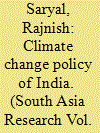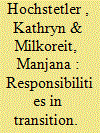|
|
|
Sort Order |
|
|
|
Items / Page
|
|
|
|
|
|
|
| Srl | Item |
| 1 |
ID:
157483


|
|
|
|
|
| Summary/Abstract |
Since the 1970s, and especially following the 1992 Rio Earth Summit, climate change has become an area of high politics, engaging the whole world at the international and diplomatic level. What matters, though, is how this translates into tangible policies at national and local levels, and how these different scales interact. Highlighting India’s unique position in international climate negotiations, this article first scrutinises various official statements and documents of the Government of India (GOI) on climate change and puts them into an analytical framework that demonstrates continuities, but also significant recent shifts. Investigating the reasons for such modifying trends and examining their consequences, the article then suggests that partly owing to recent changes in global and (geo)political contexts, but also due to an Indian re-thinking of responsibility for addressing global climate change, there is a significant new development. This seems to augur a South Asian ‘silent revolution’ in green technologies, a prudent, economically and ecologically beneficial step, not only for India but possibly a sustainable global model.
|
|
|
|
|
|
|
|
|
|
|
|
|
|
|
|
| 2 |
ID:
148557


|
|
|
|
|
| Summary/Abstract |
Non-State Actors (NSAs) are regarded as important stakeholders in global climate negotiations to uphold the views of climate change victims all over the world. Defining NSAs and why do state actors allow them to participate in the negotiation process are drawing academic interest. During the Conference of Parties (COP), under the United Nations Framework Convention on Climate Change (UNFCCC), NSAs try to influence policies by sharing knowledge and enforcing pressure on state actors in order to adopt effective policies. In contemporary climate change negotiations, NSAs’ policy influence can be understood in two ways: first, as “outsider”, when they put pressure on state actors without participating in the negotiation; an second, as “insider”, when they directly participate in the negotiation process. In this respect, the main objectives of this paper are to evaluate policy influencing strategies of NSAs in the negotiations and what are the challenges they face to influence the policies.
|
|
|
|
|
|
|
|
|
|
|
|
|
|
|
|
| 3 |
ID:
138817


|
|
|
|
|
| Summary/Abstract |
The BASIC countries (Brazil, South Africa, India, and China) play an increasingly prominent role in global climate negotiations. Climate governance spotlights burden-sharing arrangements, asking countries to take on potentially costly actions to resolve a global problem, even as the benefits are generally indivisible public goods. This article examines the BASIC countries’ own Joint Statements and their individual and collective submissions to multilateral climate negotiations to identify the rationalist and principled arguments they have made about the climate burden-sharing requirements that developed countries, developing countries, and they themselves should face in global climate governance. It argues that their expectations for their own role are particularly unclear, with greater national action than international commitments to do so.
|
|
|
|
|
|
|
|
|
|
|
|
|
|
|
|
|
|
|
|
|